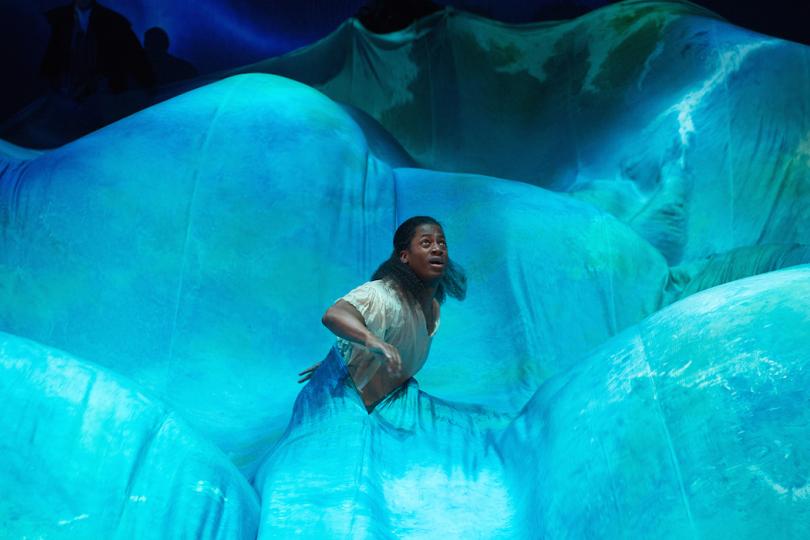What have we learned?

Joseph Haj’s production of Pericles at the Guthrie clearly needs very little introduction. As the first example of Haj’s theatrical work that most local audiences will see, Pericles is, in essence, Haj’s job interview for the Guthrie’s audience. So, as one of Haj’s many evaluators sitting in the audience this weekend, I had three questions that I hoped Pericles would answer.
- Is he any good?
- How will he distinguish himself from Joe Dowling’s legacy?
- What will he do with the resources the Guthrie puts at his disposal?
Number one: is Joe Haj any good as a director? My answer, based on the one example I’ve seen, is a resounding yes. Pericles is not one of Shakespeare’s more commonly produced plays, and I could see why: a lot of the action takes place through poetic narration, and the story jumps quickly over large spans of both time and space. But through both design and pace, Haj has been extremely clever about dealing with the play’s narrative challenges – not to mention bringing in an excellent cast, all but one of whom has been imported from the original Oregon Shakespeare Festival production.
Music is one major element that can help a play like this to flow, and composer Jack Herrick has hit just the right notes. His score combines old-timey sounds with electronic sampling and tuneful melodies, all of which hearken back to a troubadour or folk tradition without borrowing too literally from any one style. Not only do the instrumentals effectively set the mood, but the vocals bring Shakespeare’s poetry to life in a way that enriches their original meaning (rather than distracting from it, as I have seen other productions do by trying, and failing, to imitate a pseudo-Elizabethan style too closely).
Rui Rita and Raquel Barreto, who designed the lighting and costumes, clearly worked in tandem to create a beautiful color palette of whites, golds, and blues that evoke the Mediterranean landscape. Some of the styling was reminiscent of the costuming on Game of Thrones, and I mean this as a compliment: Pericles travels to a number of different lands, and each has its own elegant and culturally-distinct style of dress.
Haj’s smartest directorial move, in my mind, was in his willingness to take time for action when needed. Although Shakespeare’s words are the main attraction of his plays, this production never made us feel like we were rushing to get from one witty line or poetic soliloquy to the next. Haj lets us breathe and sit with the poetry – not for so long that the play feels slow, but for just enough time that we can digest both the play’s factual and emotional content.
Number two: how is Haj different from Dowling? All of the elements above speak to ways that, at least in his treatment of Shakespeare, Haj distinguishes himself from Joe Dowling’s style. Whether you liked it or not, Dowling’s interpretations of Shakespeare often tended towards embellishment (consider his most recent pop-culture laden production of A Midsummer Night’s Dream or his 2009 Macbeth, set in the mid-20th century).
But although Haj has incorporated original music and makes good use of the technical capabilities of the thrust stage, Pericles doesn’t feel frilly in the way that Dowling’s productions did. The technical choices behind the production feel organic and in service of the text, right down to the wave-like flow of Jan Chambers’ simple, tiered set. The large video projections by Francesca Talenti are atmospheric rather than distracting, particularly in scenes with fire or water. (There are more abstract, colorful projections that felt less successful to me, because they reminded me of old-school Windows screensavers, but the overall effect of the video is positive.) Where Dowling used superimposed production elements to create a narrative, Haj uses his technical resources to enrich the story that’s already there.
A second, but no less important, distinction is in Haj’s treatment of comedy. Pericles features a pretty questionable scene in which a brothel madam and her employees put a kidnapped 18-year-old girl to “work.” It’s meant to be funny, but the humor could be played in any number of different ways. I suspect that many directors would go for the broad-strokes physical comedy that, who knows, Shakespeare may have intended. And Haj certainly doesn’t overlook the comedic value of the scene – but neither does he go so far as to try and mask the disturbing level of sexual violence that modern audiences will be sure to notice. I was definitely taken aback at the direction the plot went (temporarily), but relieved that Haj does not use it for cheap laughs. It’s a thorny dramaturgical issue, and Haj treats it sensitively.
Finally: what will Haj do with the Guthrie’s resources? This is the big mystery. You’ve probably noticed that I haven’t said anything about the acting in Pericles, and that’s not because it’s bad. Far from it: Haj has assembled a uniformly stellar cast that knows how to interpret Shakespeare both clearly and poetically. But, as I mentioned earlier, the cast was imported from the Oregon Shakespeare Festival – as were the movement director and the stage manager, as well as the music, set, costume, sound, and video designers. (If you’re counting, the local talent was: Casey Hoekstra, in the ensemble; Rui Rita, the lighting designer; Lucinda Holshue, the Guthrie’s voice and dialect coach; and Justin Hossle. the assistant stage manager. That’s it, as far as it goes for people with biographies listed in the program.)
So Haj brought in a sample of his previous work to use as his local job interview. Given the demands of stepping into a new job as the Guthrie’s Artistic Director, I certainly don’t blame him for easing his way in with an imported production, particularly when the production is as excellent as this one.
But now that he’s proven himself as a director with a clear and distinct voice, I am eager to see what he’ll do with all the talent that he can find closer at hand.




